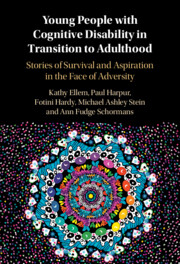 Young People with Cognitive Disability in Transition to Adulthood
Young People with Cognitive Disability in Transition to Adulthood Book contents
- Young People with Cognitive Disability in Transition to Adulthood
- Young People with Cognitive Disability in Transition to Adulthood
- Copyright page
- Dedication
- Epigraph
- Contents
- Figures
- Tables
- Preface
- Acknowledgements
- Chapter 1 Introduction
- Chapter 2 Violence against Young People with Cognitive Disability
- Chapter 3 Working in Partnership with People with Lived Experience
- Chapter 4 Amethyst’s Story
- Chapter 5 Experiences of Young People with Cognitive Disability
- Chapter 6 The Many Faces of Violence
- Chapter 7 Young People and the National Disability Insurance Scheme
- Chapter 8 Don’t Give Up on Us
- Chapter 9 Housing, Home, and Mental Well-Being
- Chapter 10 Young People’s Experiences of the Child Protection and Criminal Justice Systems
- Chapter 11 Having Someone in Your Corner
- Chapter 12 In the Voices of Participants
- References
- Index
Chapter 11 - Having Someone in Your Corner
Published online by Cambridge University Press: 06 February 2025
- Young People with Cognitive Disability in Transition to Adulthood
- Young People with Cognitive Disability in Transition to Adulthood
- Copyright page
- Dedication
- Epigraph
- Contents
- Figures
- Tables
- Preface
- Acknowledgements
- Chapter 1 Introduction
- Chapter 2 Violence against Young People with Cognitive Disability
- Chapter 3 Working in Partnership with People with Lived Experience
- Chapter 4 Amethyst’s Story
- Chapter 5 Experiences of Young People with Cognitive Disability
- Chapter 6 The Many Faces of Violence
- Chapter 7 Young People and the National Disability Insurance Scheme
- Chapter 8 Don’t Give Up on Us
- Chapter 9 Housing, Home, and Mental Well-Being
- Chapter 10 Young People’s Experiences of the Child Protection and Criminal Justice Systems
- Chapter 11 Having Someone in Your Corner
- Chapter 12 In the Voices of Participants
- References
- Index
Summary
Family, friends, partners, and pets can help young people with cognitive disability as they become adults. Some young people with cognitive disability had families who spoke up for them and helped them when times were hard. Some young people with cognitive disability had partners who helped them feel good about themselves. Friends could help young people with cognitive disability leave abusive situations. Professionals can do more to help young people with cognitive disability make friends and be part of their community.
Keywords
- Type
- Chapter
- Information
- Young People with Cognitive Disability in Transition to AdulthoodStories of Survival and Aspiration in the Face of Adversity, pp. 209 - 221Publisher: Cambridge University PressPrint publication year: 2025
